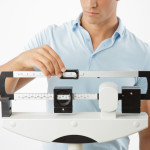
People of all different weights can be healthy, and in general, your habits (diet, exercise, sleep, stress management, etc.) are more important than what you weigh. If you want to be healthier, make sure that you’re eating three meals a day plus healthy snacks in between to give you energy throughout the day. At each meal, try to have some fruit and vegetables, some carbohydrates (such as rice, bread, pasta, potato), some protein (such as meat, chicken, fish, tofu, beans, nuts), and a small amount of fat (such as olive oil, cheese, avocado). Also, make sure that you eat enough to support your physical activity; too little food eaten and too much exercise can leave you feeling tired, weak, and possibly dizzy.
If you’re underweight, it may mean that you aren’t eating enough and your body may need more energy in the form of calories to get to a healthy weight. You can ask your health care provider or a registered dietitian about how many calories you need to support your growth. Teenagers need to eat enough in order for their bodies to grow.
It’s important to be aware of the signs of an eating disorder. Do you find yourself thinking about food all the time but not allowing yourself to eat? Do you make yourself throw up or exercise after meals in order to ‘get rid’ of the calories you ate? If you think you might have an eating disorder or are unable to eat enough to maintain a healthy body weight for any reason, please see your health care provider. He or she will look at your growth chart and tell you whether or not your current weight is healthy for you.
Source: Read Full Article
